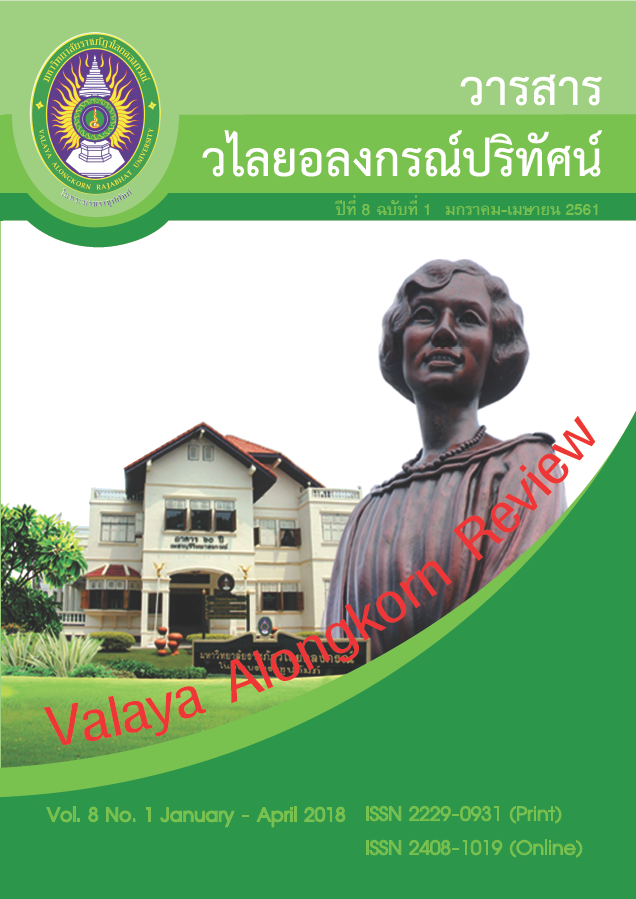COMPARISONS OF ARGUMENTATION AND CRITICAL THINKING ABILITIES FROM LEARNING SOCIO-SCIENTIFIC ISSUES USING THE MIXED METHODS BASED ON BRAIN- BASED LEARNING AND THE TRADITIONAL LEARNING METHOD OF PRATOMSUKSA 5 STUDENTS WITH DIFFERENT GENDERS
Keywords:
Socio-scientific Issues, The Mixed Methods Based on Brain-based Learning, Argumentation, Critical ThinkingAbstract
This research aimed to study and compare the effects of two teaching and learning methods on argumentation and critical thinking of fifty-nine grade 5 students with different genders. They were selected using the cluster random sampling technique and divided into 2 groups: the experimental group of 30 students learned using the mixed methods based on brain- based learning method and the control group of 29 students learned using the traditional learning method. Research instruments included: (1) learning plans on 3 socio-scientific issues: human cloning, Waste Incineration and Chemical Usage in Vegetable Planting, 3 plans for each group & each plan for 3 hours of learning in a week; (2) four argumentation tests, and (3) the critical thinking abilities test. The collected data were analyzed for testing hypotheses using the paired t-test and the F-test (Two-way MANCOVA and ANCOVA).
The major findings revealed that the whole students, the female students & the male students of both the experimental and the control group showed developments in argumentation from the 1st test to the 4th test; and showed gains in critical thinking abilities as a whole and in 4 subscales from before learning. Whereas the students with different genders did not indicate different argumentation and critical thinking. However, the experimental group students evidenced more critical thinking in general and in three subscales: deduction, induction and assumption identification, than the control group students. In addition, there were no statistical interactions of learning method with gender on argumentation and critical thinking. In summary, the mixed methods based on brain-based learning approach could appropriately develop argumentation and critical thinking of the students.
References
จิตติมา นนท์นภา. (2556). การเปรียบเทียบผลการเรียนประเด็นปัญหาทางสังคมที่เกี่ยวข้องกับการใช้วิทยาศาสตร์ระหว่างรูปแบบการเรียนแบบผสมผสานตามรูปแบบของ Wheatley กับการเรียนแบบปกติที่มีต่อความสามารถในการโต้แย้งและการคิดเชิงวิพากษ์ วิจารณ์ของนักเรียนชั้นประถมศึกษาปีที่ 6 ที่มีเพศต่างกัน. วิทยานิพนธ์การศึกษามหาบัณฑิต สาขาวิชาวิทยาศาสตรศึกษา มหาวิทยาลัยมหาสารคาม.
โชคชัย ยืนยง. (2550). การใช้แนวคิดวิทยาศาสตร์ เทคโนโลยีและสังคมในการจัดการเรียนรู้วิทยาศาสตร์. วารสารวิชาการสำนักงานคณะกรรมการการศึกษาขั้นพื้นฐาน กระทรวงศึกษาธิการ. 10(2): 29-34, เมษายน-มิถุนายน.
ณฐพงศ์ มาแสง. (2556). การเปรียบเทียบผลการเรียนประเด็นปัญหาทางสังคมที่เกี่ยวข้องกับการใช้วิทยาศาสตร์โดยใช้การเรียนการสอนแบบผสมผสานตามวิธีการทางวิทยาศาสตร์กับการเรียนแบบปกติที่มีต่อความสามารถในการโต้แย้งและการคิดเชิงเหตุผลของนักเรียนชั้นประถมปีที่ 6 ที่มีเพศต่างกัน. วิทยานิพนธ์การศึกษามหาบัณฑิต สาขาวิชาวิทยาศาสตรศึกษา มหาวิทยาลัยมหาสารคาม.
ธิดาวรรณ์ สีหะวงษ์. (2556). การเปรียบเทียบผลสัมฤทธิ์ด้านการอ่านเชิงวิเคราะห์และแรงจูงใจใฝ่สัมฤทธิ์ ของนักเรียนชั้นประถมศึกษาปีที่ 3 ระหว่างการจัดกิจกรรมการเรียนรู้แบบ BBL และแบบ 4 MAT. วิทยานิพนธ์การศึกษามหาบัณฑิต สาขาวิชาหลักสูตรและการสอน มหาวิทยาลัยมหาสารคาม.
นิราศ จันทรจิตร. (2553). การเรียนรู้ด้านการคิด. มหาสารคาม: สำนักพิมพ์มหาวิทยาลัยมหาสารคาม.
ประภัสสร กองแก้ว. (2554). การเปรียบเทียบผลการเรียนประเด็นปัญหาทางสังคมที่เกี่ยวข้องกับวิทยาศาสตร์ที่มีต่อความสามารถในการโต้แย้งและการคิดเชิงวิพากษ์วิจารณ์ของนักเรียนมัธยมศึกษาปีที่ 3 ที่มีเพศต่างกัน. วิทยานิพนธ์การศึกษามหาบัณฑิต สาขาวิชาวิทยาศาสตรศึกษา มหาวิทยาลัยมหาสารคาม.
ไพฑูรย์ สุขศรีงาม. (2530). แนวคิดเกี่ยวกับกระบวนการทางวิทยาศาสตร์. วารสารวิจัยและพัฒนาการเรียนการสอน. 2(2): 1-8, กรกฎาคม-ธันวาคม.
ไพฑูรย์ สุขศรีงาม. (2534). ค่านิยมวิทยาศาสตร์กับการสอนวิทยาศาสตร์. วารสารมหาวิทยาลัยศรีนครินทรวิโรฒมหาสารคาม. 10(2): 60-74.
ไพฑูรย์ สุขศรีงาม. (2550). เอกสารประกอบการสอน เรื่อง ความรอบรู้หรือความแตกฉานทางวิทยาศาสตร์และเทคโนโลยี (Scientific & Technological Literacy). มหาสารคาม: บัณฑิตวิทยาลัย มหาวิทยาลัยมหาสารคาม.
วินนา ประคองบุญ. (2556). การเปรียบเทียบผลการเรียนประเด็นปัญหาทางสังคมที่เกี่ยวข้องกับการใช้วิทยาศาสตร์ โดยใช้การเรียนการสอนแบบผสมผสานตามรูปแบบวิธีการทางวิทยาศาสตร์กับรูปแบบปกติที่มีต่อความสามารถในการโต้แย้งและการคิดวิพากษ์วิจารณ์ของนักเรียนชั้นมัธยมศึกษาปีที่ 2 ที่มีเพศต่างกัน. วิทยานิพนธ์การศึกษามหาบัณฑิต สาขาวิชาวิทยาศาสตรศึกษา มหาวิทยาลัยมหาสารคาม.
สถาบันส่งเสริมการสอนวิทยาศาสตร์และเทคโนโลยี (สสวท.). (2546). การจัดสาระการเรียนรู้ กลุ่มวิทยาศาสตร์หลักสูตรการศึกษาขั้นพื้นฐาน. กรุงเทพฯ: สถาบันส่งเสริมการสอน วิทยาศาสตร์และเทคโนโลยี.
อรพินท์ ตันเมืองใจ. (2556). ความสามารถในการสื่อสารทางวิทยาศาสตร์ของนักเรียน ชั้นประถมศึกษาปีที่ 5 ที่เรียนโดยใช้กิจกรรมการเรียนรู้แบบใช้สมองเป็นฐาน. วิทยานิพนธ์การศึกษามหาบัณฑิต สาขาวิชาวิทยาศาสตรศึกษา มหาวิทยาลัยเชียงใหม่.
Ausubel, D. (1968). Educational Psychology. New York: Holt, Rinehart & Winston.
Barrows, H. & Tamblyn, R. (1980). Problem-based Learning: An Approach to Medical Education. New York: Springer Publishing.
Caine, R. N. & Caine, G. (2004). The Core Principles of Brain-Based Learning. [Online]. Available From: <http//www.emtech.net/brain based Learning. cfm [10 march 2017]
Fowler, H. W. & Fowler, F. G. (1990). The Concise Oxford Dictionary of Current English. (8th ed). Oxford: Clarender Press.
Kolsto, S. D. (2001). Scientific Literacy for Citizenship Tools for Dealing with the Science Dimension of Controversial Scientific Issues. Science Education. 85(3): 291-310.
Lewis, S. E. (2003). Issue-Based Teaching in Science Education. [Online]. Available from: https://www.actionbioscience.org/education/lewis.html. [21 June 2017].
Lin, S. & Mintzes, J. J. (2010). Learning Argumentation Skills through Instruction in Socioscientific Issues. Taiwan: National Science Council.
Pedretti, E. (1999). Decision Making and STS Education: Exploring Scientific Knowledge and Social Responsibility in Schools and Science Center through an Issues based Approach. School Science & Mathematics. 99(4): 174-181.
Sadler, T. D. (2002). Socioscientific Issue Research and Its Relevance for Science Education. [Online] Available from: https://www. Eric.ed.gov (21 June 2017).
Sadler, T. D., & Zeidler, D. L. (2005). The significance of content knowledge for informal reasoning regarding socioscientific issues: Applying genetics knowledge to genetic engineering issues. Science Education. 89(1): 71-93.
Watson, G. & Glaser, E. M. (1964). Critical Thinking Appraisal Manual. New York: Harcout Brace & World. [Online], Available: https://student.plattsburgh.edu/flem6282/Brain_Based_Lesson_Plan.html
Yager, R. E. (1984). The Major Crisis in Science Education. School Science and Mathematics. 84(3): 189-197.
Downloads
Published
How to Cite
Issue
Section
License
ข้อความที่ปรากฏในบทความแต่ละเรื่องในวารสารวไลยอลงกรณ์ปริทัศน์ เป็นความคิดเห็นของผู้นิพนธ์แต่ละท่าน มิใช่เป็นทัศนะและมิใช่ความรับผิดชอบของกองบรรณาธิการจัดทำวารสาร และ
มหาวิทยาลัยราชภัฏวไลยอลงกรณ์ ในพระบรมราชูปถัมภ์



